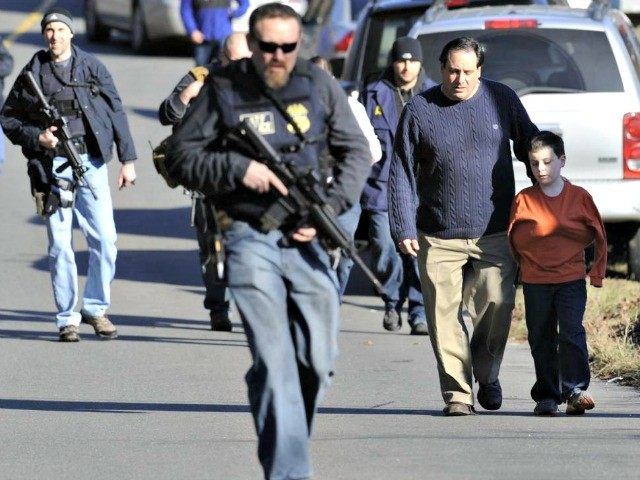On February 12, the Sandy Hook Advisory Commission Report to Connecticut Governor Dannel Malloy (D) referenced over nine minutes with no armed resistance while Adam Lanza carried out his heinous acts on December 14, 2012.
The commission’s report indicates he “arrived at the school shortly before 9:30 a.m.,” where “489 students and 82 staff members” sat in a gun free zone. He parked in a “no parking” area, got out of his car, and shot his way through a front window because the front doors were locked.
The first 911 call was placed at “9:35:39 a.m.” and the first officer arrived at the school at 9:39 a.m. That’s after Lanza had already had nine unimpeded moments of attack time.
So how should we respond to this? And how, in particular, should school planners respond?
The commission’s report says anti-bullying techniques are part of the answer; that such an approach “has been shown to dramatically improve safe school climates.” It also stresses that staff and teachers need to make sure a child doesn’t feel isolated. For it is “a sense of isolation and the breakdown in communication channels that can lead to violence.”
What this has to do with a 20-year-old attacker who had not been a student at Sandy Hook Elementary since completing fourth grade is anyone’s guess. But these are the kind of things numerous “experts” said were important, along with choosing the right school location and conducting an “emergency response time analysis” (ERTA) to determine how long it will take police to respond to “a school in a crisis situation.”
The report also recommends that classroom doors be lockable from the inside, as they believe “there has never been an event in which an active shooter [has] breached a locked classroom door.” The commission’s report also suggests the creation of new “school security and safety committees,” going so far as to outline who should be appointed to said committees and how.
Recommendations for “remotely controlled locks,” a buzzer system–whereby people can be buzzed through–cameras, “closed circuit television,” and bullet resistant and/or blast resistant glaze for classroom windows, are part of the report as well. And while these things will aid in sheltering-in-place once the school building is breached, they do not put an active response in place to eliminate the threat once it shows itself.
To solve this problem, the commission recommends universal background checks–including a ban on private “gun show sales.” They recommend a “certificate of registration” be required for every firearm in the state, that ammunition purchases only be allowed for registered firearms, that Internet ammunition sales be regulated or banned, that “high capacity” magazines be banned, that “any firearm capable of firing more than 10 rounds without reloading” be banned, and the list goes on.
But here’s the problem–Lanza stole his guns, so rules that add new regulations and steps through which one must go to get a gun would not have helped in his situation and will not help in future, similar situations. And a limit on magazine capacity would not have made a difference either, as we’ve already seen that gunmen intent on killing simply buy more 10 round magazines to make up for their lack of 15 or 30-round magazines.
The bottom line is that the majority of the commission’s recommendations increase bureaucracy at the local and state level while curbing the exercise of constitutional rights by law-abiding citizens. Through it all, they are reactive instead of pro-active–i.e., they deal with cutting response time to a crisis instead of meeting and eliminating the threat that causes the crisis.
Armed teachers/staff members can meet and eliminate the threat.
Follow AWR Hawkins on Twitter @AWRHawkins. Reach him directly at awrhawkins@breitbart.com.

COMMENTS
Please let us know if you're having issues with commenting.